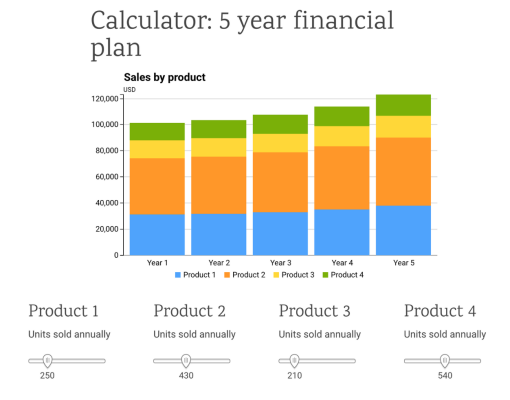Grid, a SaaS startup founded in Iceland that lets you turn spreadsheets into visual “narratives,” has closed $12 million in Series A funding.
The round is led by New Enterprise Associates (NEA), with participation from existing investors BlueYard Capital, Slack Fund, Acequia Capital and other unnamed “strategic” partners. The injection of capital will be used by the company to bring its product to market and for further product development.
Founded in late 2018 by Hjalmar Gislason — who was previously behind DataMarket, an early mover in the “Data-as-a-Service” space — Grid is on a mission to change the way knowledge workers interact with data, starting with spreadsheets. Opening up its beta today, the SaaS enables you to turn spreadsheet workbooks into visual and interactive websites so that the data residing in them can be better communicated to various audiences.
“Grid provides a way for the everyday spreadsheet user to easily create visual and interactive narratives on top of existing spreadsheets and securely share them using the web,” Gislason explains.
“Most data tools, even the most accessible ‘self-service’ tools, are power user tools — meaning it takes time and deliberate effort to learn how to use them, and the people that do become the go-to-people within their organizations when it comes to analysis, data-driven decisions and data narratives. The tool everyone else uses to get stuff done in their day-to-day work is the spreadsheet”.
Gislason frames the initial problem the startup is focusing on as the moment when someone has pulled together data or built a model in a spreadsheet and now has to communicate it with someone else. “The most common method, even today, is attaching an Excel file to an email. In doing so the spreadsheet author is giving up control over the spreadsheet, how its read and further distributed,” he says.
Furthermore, that content is painful to consume on mobile devices and it is difficult making sure everyone has the latest version. Sharing spreadsheets in the cloud is an improvement but is still far from optimum.
To overcome this, people typically copy and paste charts and tables out of spreadsheets into PowerPoints and PDFs and distribute these as static artefacts, which solves the control problem but is difficult to create and maintain as it disconnects the presentation from “the underlying data and models”. Grid aims to change this.
During Grid’s private beta period, the startup saw two core use-cases. The first was model presentation, such as a consultant or a business analyst that has built a spreadsheet model and needs to communicate how the inputs affect the outcomes. The second is reporting, seeing Grid used by anyone that needs to regularly report data they’ve pulled together in a spreadsheet.
“And that’s a lot of people!” adds Gislason. “Our users like the combination of text and data visualization that Grid offers, in addition to the fact that the Grid documents are directly linked to the underlying workbooks so that any change in the workbook, even a local Excel file, is immediately reflected in the online report”.
[ad_2]
Source link



